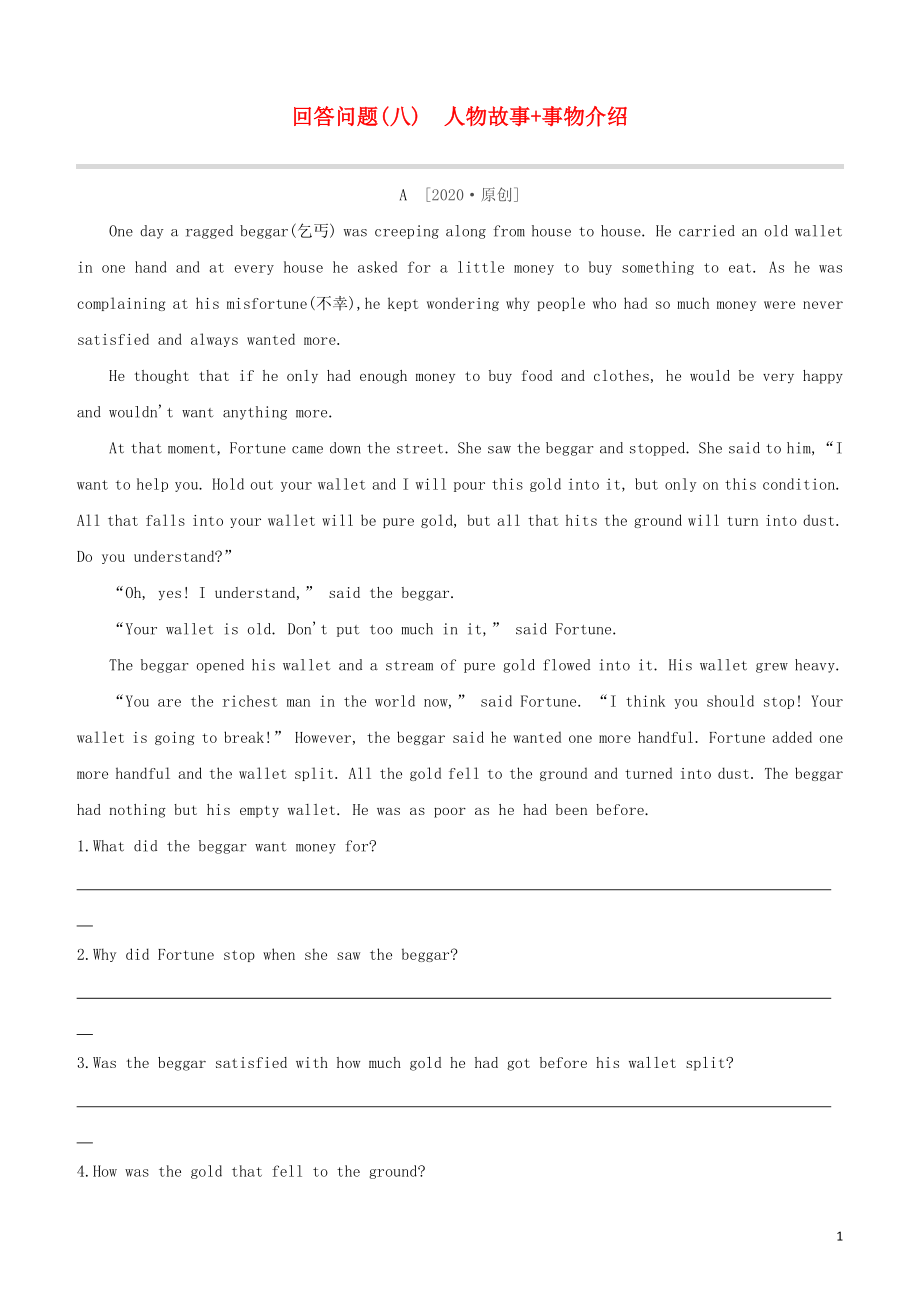《(吉林專版)2020中考英語復(fù)習(xí)方案 回答問題(08)人物故事+事物介紹試題》由會員分享�����,可在線閱讀,更多相關(guān)《(吉林專版)2020中考英語復(fù)習(xí)方案 回答問題(08)人物故事+事物介紹試題(4頁珍藏版)》請在裝配圖網(wǎng)上搜索�。
1、回答問題(八) 人物故事+事物介紹
A [2020·原創(chuàng)]
One day a ragged beggar(乞丐) was creeping along from house to house. He carried an old wallet in one hand and at every house he asked for a little money to buy something to eat. As he was complaining at his misfortune(不幸),he kept wondering why people who had so much
2����、 money were never satisfied and always wanted more.
He thought that if he only had enough money to buy food and clothes, he would be very happy and wouldn't want anything more.
At that moment, Fortune came down the street. She saw the beggar and stopped. She said to him,“I want to help you. Hold o
3、ut your wallet and I will pour this gold into it, but only on this condition. All that falls into your wallet will be pure gold, but all that hits the ground will turn into dust. Do you understand?”
“Oh, yes! I understand,” said the beggar.
“Your wallet is old. Don't put too much in it,” said Fort
4�、une.
The beggar opened his wallet and a stream of pure gold flowed into it. His wallet grew heavy.
“You are the richest man in the world now,” said Fortune. “I think you should stop! Your wallet is going to break!” However, the beggar said he wanted one more handful. Fortune added one more handful
5、 and the wallet split. All the gold fell to the ground and turned into dust. The beggar had nothing but his empty wallet. He was as poor as he had been before.
1.What did the beggar want money for?
?
2.Wh
6�����、y did Fortune stop when she saw the beggar?
?
3.Was the beggar satisfied with how much gold he had got before his wallet split?
7���、 ?
4.How was the gold that fell to the ground?
?
5.What can you learn from the story?
?
B
Su
8�、perstition about Sneezing
It's a Western custom to say “bless you” after someone sneezes.
“Achoo!”
“Bless you.”
This is a common exchange in English-speaking countries. When you hear someone else sneeze, it is polite to say “bless you”, to which they should reply with “thank you”. But where does
9���、 this odd custom come from?
In fact, it dated back to medieval(中世紀(jì)的) Europe, specifically, the time of the bubonic plague(黑死病). The plague killed nearly one-third of Europe's population within three years(1347-1350). The first symptom of the bubonic plague was sneezing. At that time, people believe
10��、d that if you sneezed, your soul might leave your body.
People didn't know how to cure the bubonic plague. They were simply encouraged to say “God bless you” and do other superstitious(迷信的) things, hoping the soul would go back into the body. And over time, “God bless you” was shortened to “Bless y
11����、ou”.
Of course, in modern times, we know that sneezing has nothing to do with the soul or any other superstitious thing. But just like so many other customs from the past, saying “bless you” has stayed with us for hundreds of years.
But you may be wondering—what if someone sneezes more than once?
12����、Well, you don't have to keep saying “bless you”. In fact, if someone sneezes more than twice, or sneezes especially loudly, you may want to ask them if they're OK, or if they would like a tissue(紙巾).
Then again, you don't really need to say anything at all. People won't think you're rude if you for
13�����、get to say “bless you”. But they will also appreciate it if you do.
1.Where does the odd custom “bless you” come from?
?
2.What was the first symptom of the bubonic plague?
14�����、 ?
3.Did people know how to cure the bubonic plague in the past?
?
4.How long has “bless you” stayed with us?
15、 ?
5.What should you do if someone sneezes more than twice?
?
【參考答案】
A 1.To buy some food and clothes.
2.To help him./Because she wanted
16����、 to help him.
3.No, he wasn't.
4.All the gold turned into dust.
5.We shouldn't want too much.(答案不唯一,合理即可。)
B 6.(Medieval) Europe./The time of the bubonic plague.
7.Sneezing.
8.No./No, they didn't.
9.For hundreds of years.
10.We can ask them if they're OK, or if they would like a tissue.
4
 (吉林專版)2020中考英語復(fù)習(xí)方案 回答問題(08)人物故事+事物介紹試題
(吉林專版)2020中考英語復(fù)習(xí)方案 回答問題(08)人物故事+事物介紹試題

